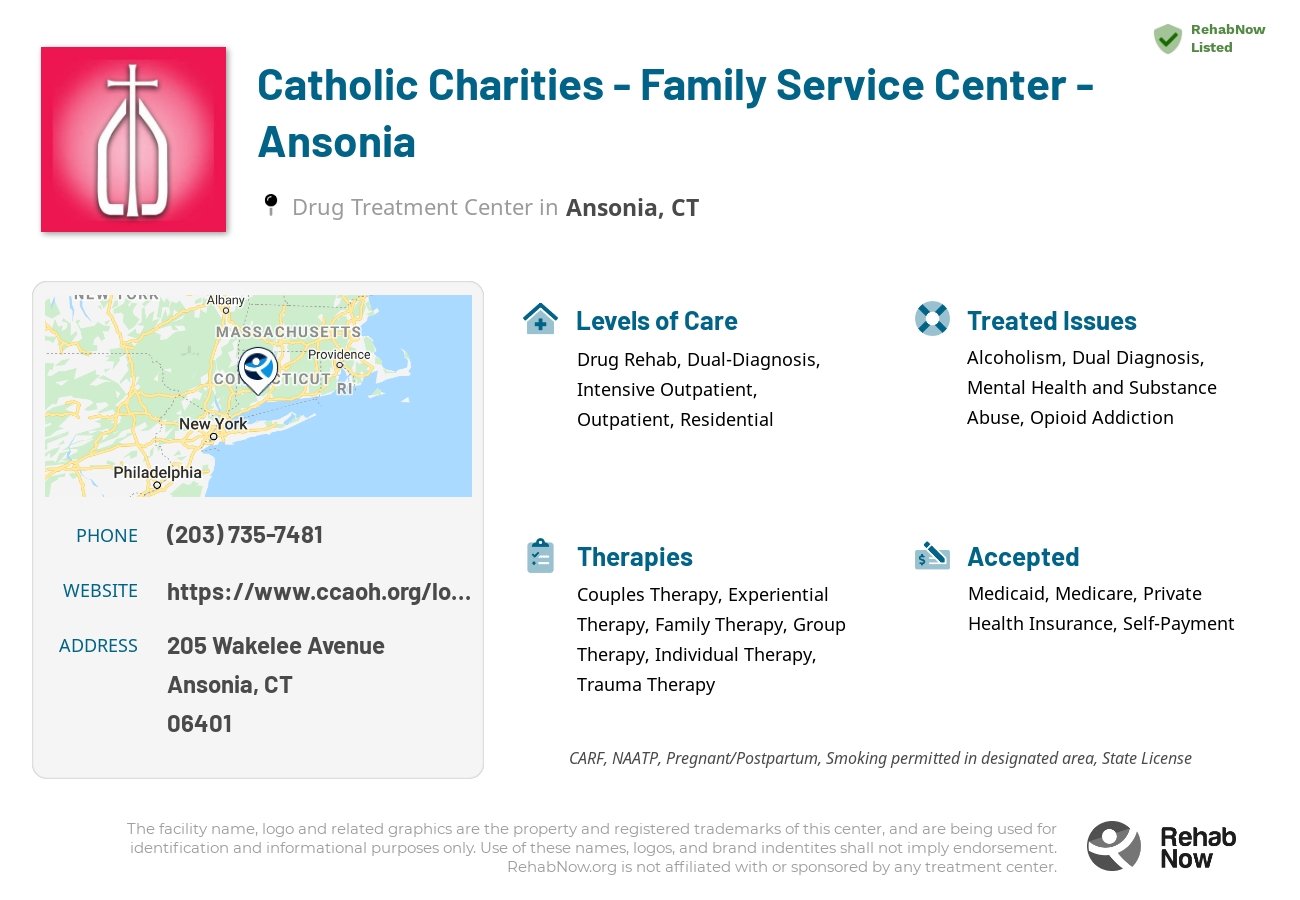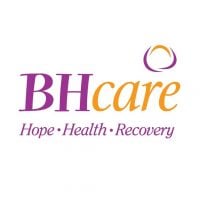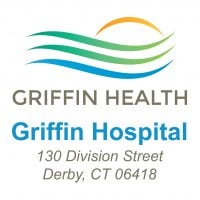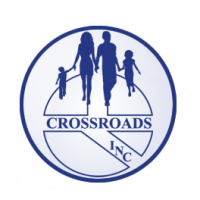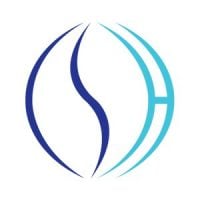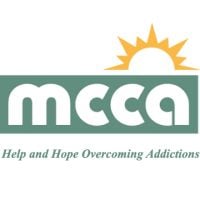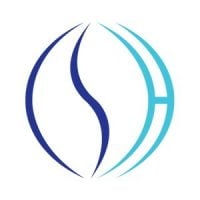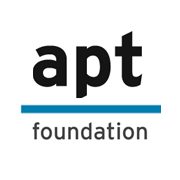Catholic Charities - Family Service Center - Ansonia
Drug Rehab Center in Ansonia, Connecticut
Catholic Charities - Family Service Center - Ansonia provides a range of addiction and substance abuse services, including individual and group therapy, family support services, and medication-assisted treatment, and is accredited by the Commission on Accreditation of Rehabilitation Facilities.
About Catholic Charities - Family Service Center - Ansonia in Connecticut
Catholic Charities - Family Service Center - Ansonia is a non-profit, faith-based organization that provides a wide range of services and support to individuals and families in the Ansonia, Connecticut area. Its mission is to provide a "safe haven of hope" for people of all backgrounds seeking care and support regardless of their spiritual beliefs. The center offers an array of programs, including counseling, addiction treatment, and other services and support. Many of these services and programs focus on helping people with addiction and substance abuse issues become self-sufficient and lead healthy and productive lives.
The Catholic Charities - Family Service Center - Ansonia offers a range of services for addiction and substance abuse issues. These include individual and group therapy, educational programs, and family therapy. The center also provides medication-assisted treatment, relapse prevention, and aftercare services. It also offers a supportive environment where individuals can address the underlying causes of addiction and build coping skills to promote long-term recovery. The center also provides family support services to help strengthen family relationships and promote healthy lifestyles.
Additionally, Catholic Charites - Family Service Center - Ansonia is accredited by the Commission on Accreditation of Rehabilitation Facilities. They are also licensed by the state of Connecticut and are members of the National Association of Addiction Treatment Providers. In addition to these accreditations and memberships, the center has received a number of awards and recognitions, including the 2020 Program Excellence Award from the National Council on Alcoholism and Drug Dependence.
Genders
Ages
Modality
Additional
Conditions and Issues Treated
Many people who struggle with opioid addiction need to attend specific programs like methadone , Suboxone or Vivitrol clinics.
These types of programs will provide the patient with legal, prescription medications that can help them overcome their cravings for illegal opioids like heroin or fentanyl . If the patient has a chronic condition like Hepatitis C, they must undergo treatment before they can begin taking these medications.
Dual Diagnosis is a specific relationship between two or more disorders that have the same symptoms and can sometimes be treated together. This is used in the treatment planning process when dealing with drug addicts. Dual diagnosis can be viewed as a chronic medical condition that has comorbid psychiatric disorders.
Although addiction and a mental illness may have separate symptoms that are not easy to detect, they often go hand in hand. Many times, drug abuse is a direct result of the mental illness. In other words, treating the addiction will not resolve all of your issues. Unless you also treat the underlying mental illness, you will not be successful in achieving sobriety.
Levels of Care Offered
This center offers a variety of custom treatment tailored to individual recovery. Currently available are Drug Rehab, Dual-Diagnosis, Intensive Outpatient, Outpatient, Residential, with additional therapies available as listed below.
An intensive outpatient program is usually the first phase of addiction treatment. It provides relief for those who are addicted, but are not ready to commit to an inpatient setting. Typically, the patient lives at home and is able to work or go to school. IOPs consist of a daily 3 to 5-hour program, and there is a required number of hours per week. Most patients go to IOP between 20 and 40 hours per week. The patient attends group counseling and individual therapy throughout the duration of treatment. They also meet daily with their therapist to discuss how it’s going and where they are in the recovery process.
The goal here is to teach patients healthy coping skills, such as stress management and identifying thoughts and behaviors that lead to relapse. The implementation of these skills will be useful as the individual transitions into the next phases of treatment.
An outpatient treatment program is set up to help with alcohol or drug addiction, or a co-occurring disorder. The patient must attend the Connecticut facility for their therapy and other programs but are able to return home each night. The frequency of mandatory attendance decreases after much of Catholic Charities - Family Service Center - Ansonia‘s program is complete.
Residential treatment programs are those that offer housing and meals in addition to substance abuse treatment. Rehab facilities that offer residential treatment allow patients to focus solely on recovery, in an environment totally separate from their lives. Some rehab centers specialize in short-term residential treatment (a few days to a week or two), while others solely provide treatment on a long-term basis (several weeks to months). Some offer both, and tailor treatment to the patient’s individual requirements.
Therapies & Programs
Individual Therapy is a critical component of addiction recovery. Therapists work with patients to identify the root of their addiction and figure out how to better handle the issues that led to them using drugs. Individual Therapy is the one-on-one session where people meet with their therapist. Individual therapy provides a safe space for people to open up and discuss personal and sensitive topics which they may not feel comfortable discussing in a group setting.
Couples therapy at Catholic Charities - Family Service Center - Ansonia focuses on addiction treatment for the addict and their spouse. The addict’s family, not just the addict, can benefit from this form of therapy. Couples therapy addresses communication problems, trust issues, lack of intimacy, and abuse in intimate relationships. Couples therapy can help rebuild trust between partners, which increases the chances for successful treatment and sustained recovery.
Intimate relationships can be damaged during addiction, and professional help may be necessary to rebuild the often destroyed trust and love. Couples therapy at Catholic Charities - Family Service Center - Ansonia helps couples improve communication and rebuild trust. Either or both partners will be helped by this treatment administered by professionals. This treatment can also help one or both partners if addiction is the problem.
Family therapy will also help families realize that the addiction is not their fault. For many years, people blamed themselves for an addict’s behavior and felt that they had done something wrong. This is not the case. Addiction is a disease, and it can strike anyone, even if their life seems fine from the outside. It can bring a lot of shame to a family when they have an addict in their midst, but if everyone is open and honest with each other, then they can help everyone stay in recovery.
Group Therapy is utilized by drug treatment centers like Catholic Charities - Family Service Center - Ansonia to provide the recovering drug addict with a platform to talk about their feelings and experiences. It also provides for an opportunity to learn from other addicts who have successfully overcome their addiction.
Group Therapy is employed in lectures, seminars, or discussion groups (the latter two are typically conducted as “therapy groups”). It is recommended that all group members be recovering addicts for this type of therapy to work (though it does not exclude others with lived experience).
Trauma therapy is a clinical process that helps individuals deal with mental stress often caused by traumatic events. It is generally done for children, teenage victims of sexual assault, and war veterans. The therapist helps the person identify, understand and work through the problem. This is done with the help of talking about it in group or one-on-one counseling sessions. Therapists use relaxation, role-playing, art, and music to help the person open up about what is bothering them.
Cognitive behavioral therapy is also a popular service for individuals living with addiction. This type of supportive treatment uses both one-on-one counseling and group sessions to teach addicts how to identify thoughts, behaviors and emotions that might increase their risk of relapse.
These professionals can help addicts develop coping skills for managing stress, improving self-esteem and overcoming triggers. They might also use behavioral therapy to help addicts learn how to avoid cravings and warning signs that could lead them back into addiction.
Therapy can be used as a step-down from inpatient treatment or as the primary method of overcoming an addiction. No matter which option is best for the addict, they will teach important emotional coping techniques, which can make it easier for addicts to get through the tough days.
Patient Experience
Experiential Therapy at Catholic Charities - Family Service Center - Ansonia
Experiential therapy is another form of treatment that helps addicts overcome their addiction. This type of service typically involves hands-on activities with the focus on physical experiences instead of emotions or beliefs.
Some examples include art therapy, equine therapy and music therapy. Each of these forms of experiential therapy can provide unique ways for addicts to channel their feelings and work through their demons. This type of therapy also allows addicts to develop meaningful emotional connections with others, which can prevent them from resorting to relapse as a coping mechanism.
Payment Options Accepted
For specific insurance or payment methods please contact us.
Is your insurance accepted?
Ask an expert, call (888) 674-0062
Catholic Charities – Connecticut Associated Centers
Discover treatment facilities under the same provider.
- Catholic Charities - Family Service Center in New Haven, CT
- Catholic Charities - El Centro de Desarrollo y Reafirmacion Familiar in Hartford, CT
- Catholic Charities - Family Service Center - Torrington in Torrington, CT
- Catholic Charities - Family Service Center - Church Street in Waterbury, CT
- Catholic Charities - Family Service Center - Milford in Milford, CT
Learn More About Catholic Charities – Connecticut Centers
Additional Details
Specifics, location, and helpful extra information.
Ansonia, Connecticut 6401 Phone Number(203) 735-7481 Meta DetailsUpdated November 25, 2023
Staff Verified
Catholic Charities - Family Service Center - Ansonia Patient Reviews
There are no reviews yet. Be the first one to write one.
Ansonia, Connecticut Addiction Information
Connecticut has a higher rate of substance abuse and addiction than the national average. The state ranks in the top 10 in the country for illicit drug dependence among those ages 18 to 25. In 2010, there were 9,211 people admitted to an alcohol treatment facility for alcohol abuse combined with a secondary drug. Connecticut ranked fifth in the United States of America for the number of fatalities involving drunk driving in 2014.
The severity of drug or alcohol addiction in Ansonia, CT, is challenging to measure. According to recent statistics, there were over 600 hospitalizations related to drug abuse in Ansonia in 2016. Many families and individuals in Ansonia struggle with addiction, and the resulting problems can be devastating. There are a few different types of treatment available in Ansonia, CT. The most common type is outpatient treatment.
Treatment in Nearby Cities
- Newington, CT (30.9 mi.)
- Brooklyn, CT (66.5 mi.)
- West Haven, CT (9.1 mi.)
- Canaan, CT (44.1 mi.)
- Cheshire, CT (14.6 mi.)
Centers near Catholic Charities - Family Service Center - Ansonia
The facility name, logo and brand are the property and registered trademarks of Catholic Charities - Family Service Center - Ansonia, and are being used for identification and informational purposes only. Use of these names, logos and brands shall not imply endorsement. RehabNow.org is not affiliated with or sponsored by Catholic Charities - Family Service Center - Ansonia.


